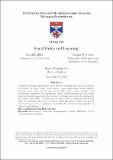Files in this item
Fiscal policy and learning
Item metadata
| dc.contributor.author | Mitra, Kaushik | |
| dc.contributor.author | Evans, George W | |
| dc.contributor.author | Honkapohja, Seppo | |
| dc.date.accessioned | 2012-02-02T10:01:04Z | |
| dc.date.available | 2012-02-02T10:01:04Z | |
| dc.date.issued | 2012-01 | |
| dc.identifier | 16659106 | |
| dc.identifier | 7dedb145-65c8-4d9a-8952-501c95dd018f | |
| dc.identifier.citation | Mitra , K , Evans , G W & Honkapohja , S 2012 ' Fiscal policy and learning ' Centre for Dynamic Macroeconomic Analysis, Working Paper 1202 , University of St Andrews . | en |
| dc.identifier.uri | https://hdl.handle.net/10023/2260 | |
| dc.description.abstract | Using the standard real business cycle model with lump-sum taxes, we analyze the impact of fiscal policy when agents form expectations using adaptive learning rather than rational expectations (RE). The output multipliers for government purchases are significantly higher under learning, and fall within empirical bounds reported in the literature (in sharp contrast to the implausibly low values under RE). Effectiveness of fiscal policy is demonstrated during times of economic stress like the recent Great Recession. Finally it is shown how learning can lead to dynamics empirically documented during episodes of "fiscal consolidations." | |
| dc.format.extent | 32 | |
| dc.format.extent | 450521 | |
| dc.language.iso | eng | |
| dc.publisher | University of St Andrews | |
| dc.relation.ispartofseries | Centre for Dynamic Macroeconomic Analysis, Working Paper 1202 | en |
| dc.subject | Government purchases | en |
| dc.subject | Expectations | en |
| dc.subject | Output multiplier | en |
| dc.subject | Fiscal consolidation | en |
| dc.subject | Taxation | en |
| dc.subject | HJ Public Finance | en |
| dc.subject.lcc | HJ | en |
| dc.title | Fiscal policy and learning | en |
| dc.type | Working or discussion paper | en |
| dc.contributor.sponsor | Economic & Social Research Council | en |
| dc.contributor.institution | University of St Andrews. School of Economics and Finance | en |
| dc.identifier.url | http://ideas.repec.org/p/san/cdmawp/1202.html | en |
| dc.identifier.grantnumber | RES-062-23-2617 | en |
This item appears in the following Collection(s)
Items in the St Andrews Research Repository are protected by copyright, with all rights reserved, unless otherwise indicated.

